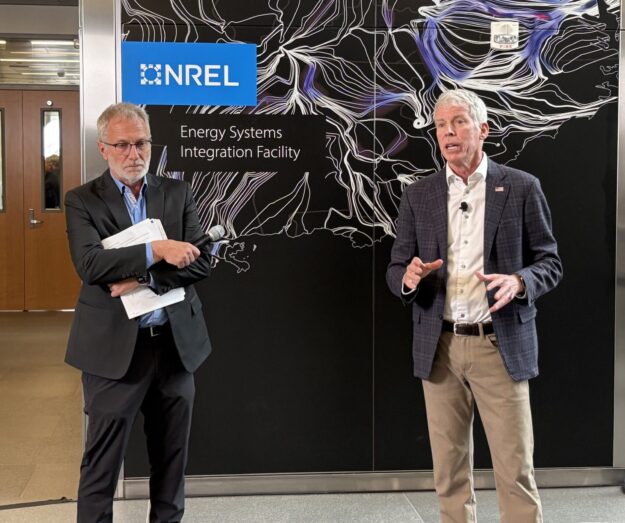Widgetized Section
Go to Admin » Appearance » Widgets » and move Gabfire Widget: Social into that MastheadOverlay zone
Trump energy secretary downplays climate change at NREL in Golden

U.S. Energy Secretary Chris Wright, right, talks to reporters alongside National Renewable Energy Laboratory Director Martin Keller at the NREL campus in Golden Thursday (Lindsey Toomer/Colorado Newsline).
U.S. Secretary of Energy Chris Wright, returning to the Denver area Thursday after he was confirmed as a member of President Donald Trump’s cabinet, repeatedly minimized the consequences of climate change when speaking to reporters during a press conference.
Wright, founder of Denver-based fracking services company Liberty Energy, spoke to employees at the Department of Energy’s National Renewable Energy Laboratory in Golden for less than 10 minutes, touching on powering artificial intelligence, electricity production and growth, and supporting national labs.
Talking to reporters after he spoke to staff, Wright said “emotional, not-fact-based stuff” like targeting hydrocarbons — the main components of climate change-causing fossil fuels — for reductions is “disruptive” and led to higher electricity and energy prices during the Biden administration.
Wright said that attributing the Marshall Fire — which in 2021 destroyed more than 1,000 homes in Boulder County, burned over 6,000 acres, caused more than $2 billion in property damage and killed two people — to climate change is “simply to not look at the data.” He said wildfires “peaked over 100 years ago” and that the U.S. government could better manage wildfire devastation through forest management to control wood fuels.
“Calling climate change a crisis is just to say ‘I’m not going to look at the science, I’m not going to look at the economics, I’m just going to run with the politics,’” Wright said.
Drier and hotter conditions in Colorado are widely viewed as having contributed to the severity of the Marshall Fire, making the potential for loss greater. Investigators said one of the fire’s origins was a spark from an Xcel Energy power line, and the utility company has since faced several lawsuits.
Wright has previously expressed deep skepticism of the scientific consensus that climate change is a global crisis.
Department layoffs
The Department of Energy, along with many other federal agencies, laid off probationary staff members, and a judge then ordered the department reinstate them. The Trump administration asked all department heads to plan for additional cuts through a “reduction in force” process.
Wright did not say how many more employees within his department could expect to lose their jobs, but he said downsizing is an “ongoing process” and that “it would be downright irresponsible if we weren’t doing this.” He said department staff grew by 20% over the four years before he took over, and “what we got out of it was a little bit more restrictions in energy production around the country.”
Energy Department leadership told workers this week it will undergo “restructuring.” Wright said each department will undergo “a very detailed organization, bottom up.”
“Every part of the government, we have to look at, how can we make government services as good as they are today or better, but at lower cost,” Wright said. “Like I do with my business, we have to look carefully at the business of where we are today and how can we deliver services at least as good as we are today at lower cost.”
In Wright’s talk to staff at the NREL, he applauded the work and dedication of the employees he spoke with and said their work is “critical.”
“The range of stuff I saw today, different people that spoke on different technologies, incredibly impressive, passionate, smart people that you can see from their heart that believe in what they’re doing, that love what they’re doing,” Wright said. U.S. Energy Secretary Chris Wright, right, talks to reporters alongside National Renewable Energy Laboratory Director Martin Keller on April 3, 2025, at the NREL campus in Golden. (Lindsey Toomer/Colorado Newsline)
After he was appointed, Wright said one of his first moves was to bring together leaders of the national labs from around the country to ask what they needed to make their work more efficient. Last week, he issued a secretarial order making changes he said resulted from those conversations.
Artificial intelligence is “the next energy-intensive manufacturing industry,” Wright said in Golden, and the U.S. should not outsource that energy production to other countries. He said he issued a request for information Thursday to gauge developer interest in building on DOE land around the country to power AI.
“We have land at all of our national labs and DOE sites around the country — who wants to come build a data center, build (a) nearby energy system, use the technology and smarts we got at the national lab … Maybe donate some computing power to us, or some lease money for the lands that’ll help fund our research,” Wright said. “We’re trying to find different ways to make the labs faster, smarter, better and more self-sufficient, more funding from other sources as well.”
Wright said he would make “a commercial arrangement” with private data center companies that want to use federal land, because “that’s where the capital is.”
NREL is responsible for researching and developing renewable energy systems and improving energy efficiency in the U.S. It has another campus in Arvada, as well as one in Alaska and in Washington, D.C., with 3,675 employees across the four locations.
Editor’s note: This story first appeared on Colorado Newsline, which is part of States Newsroom, a nonprofit news network supported by grants and a coalition of donors as a 501c(3) public charity. Colorado Newsline maintains editorial independence. Contact Editor Quentin Young for questions: info@coloradonewsline.com.


